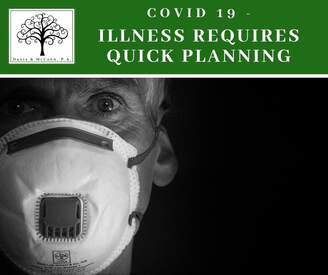 Q: I am married with four children and I haven’t done any estate planning. I have serious health issues and I’m concerned I won’t have time to do thorough estate planning before I die. I own a home, some investments, a bank account, two insurance policies, and a couple of vehicles. Is there a quick way I can preserve my assets for my family? A: Obviously if you had more time, you would want to do more sophisticated estate planning, perhaps looking at ways to save on taxes or protect your children from the risk of losing their inheritance due to divorce or creditors. However, given that your health issues require you to make emergency decisions, here are a few options for you to consider: 1. Execute a simple Last Will and Testament. Your local estate planning attorney can customize the Will to your specific wishes. This document will help transfer any of your assets that do not have a Payable-On-Death or Transfer-On-Death designation. Given a medical emergency, it’s not unusual to accomplish this in days, rather than weeks. Use caution when considering online estate planning services, as most use a “one size fits all” approach. Rarely do these services adequately address your specific family needs. 2. Sign a Durable General Power of Attorney and a Health Care Power of Attorney to authorize a person whom you trust to make your business and health care decisions should you no longer be able to. With serious illness, it is not unusual for a person to be unable to speak or make decisions on their own behalf. Make sure your spouse or another trusted individual has the ability to pay your bills, file your taxes, and make decisions with your doctors. 3. If you feel strongly about end of life issues, you’ll want to consider signing a Living Will, which is your written declaration to your doctors and family about ending treatment if you are in the active dying process. You may also want to visit with your healthcare professional about a Do Not Resuscitate (DNR) order. 4. Share the location of your important documents, computer passwords, safety deposit box key, and other personal information with a trusted family member or friend. 5. Consult your insurance agent and make sure you have named the appropriate beneficiaries on your life insurance policies. 6. Review the title to your assets. To avoid a probate proceeding and make assets rapidly available to your family, you can place Pay-On-Death or Transfer-On-Death designations on assets you own individually. Your banker or investment advisor can prepare the necessary paperwork for your signature. If you own real estate, you would need to sign and record a Transfer on Death Deed to avoid probate. Any assets not left via beneficiary designation can be transferred through a probate proceeding pursuant to the terms of your Last Will and Testament. Although these suggestions aren’t optimal under normal circumstances, they can be more beneficial to your family than having no estate planning at all. Given your unique circumstance, your emergency “to-do” list may look slightly different. An experienced estate planning attorney can expedite all facets of emergency estate planning on your behalf. For more information on emergency estate planning, please contact Davis & McCann, P. A., Dodge City, KS. We are members of Wealth Counsel, a national consortium of Estate Planning Attorneys and the National Academy of Elder Law Attorneys (NAELA). We focus our practice on providing clients with the best legal advice on Estate Planning, Medicaid and Long-term Care Planning, Family Business/Small Business Succession Planning, Probate, Trust Administration, Real Estate Transactions, and related matters. Comments are closed.
|
NEWS YOU CAN USEDavis & McCann, P. A., Archives
April 2021
Categories
All
|

 RSS Feed
RSS Feed